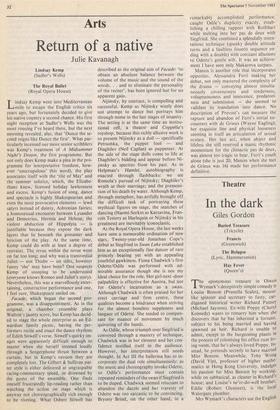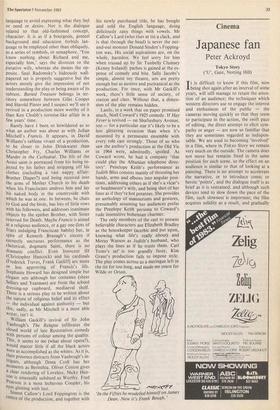Theatre
In the dark
Giles Gordon
Buried Treasure (Tricycle) Francis (Greenwich) The Relapse (Lyric, Hammersmith) Hay Fever (Queen's) he eponymous treasure in Olwen
Wymark's deceptively simple comedy is Louise Benson (Prunella Scales), mouse- like spinster and secretary to fusty, car- diganed historical writer Richard Putney (Michael Jayston). Ex-wife Poppy (Cheryl Kennedy) wants to remarry him when she discovers that he has inherited a fortune, subject to his being married and having spawned an heir. Richard is unable to admit, except to the burgeoning plants 111 the process of colonising his office cum liv- ing room, that he's always loved Poppy. In- stead, he pretends secretly to have married Miss Benson. Meanwhile, Toby Wong (David Yip), professor of higher mathe- matics at Hong Kong University, indulges his passion for Miss Benson by working, while on sabbatical, as cleaner in Richard's house; and Louise's ne'er-do-well brother, Eddie (Robert Glenister), is the local Watergate plumber.
Mrs Wymark's characters use the English
language to avoid expressing what they feel or need or desire. Nor is the dialogue related to that old-fashioned concept, character. It is as if a bourgeois, genteel background and education forbids lan- guage to be employed other than obliquely, as a series of symbols, or semaphore. 'You know nothing about Richard and me, especially him,' says the divorcee to the putative wife, whereas she means the op- posite. Saul Radomsky's hideously wall- papered set is properly suggestive but the actors mostly give the impression of not understanding the play or being aware of its subtext. Buried Treasure belongs in ter- ritory somewhere between Giles Cooper and Harold Pinter and 1 suspect we'll see it revived in a production more worthy of it than Ken Chubb's tortoise-like affair in a few years' time.
Rarely have 1 been so bewildered as to what an author was about as with Julian Mitchell's Francis. It appears, in David Williams's tableau vivant of a production, to be closer to John Drinkwater than Christopher Fry, Charles Williams or Murder in the Cathedral. The life of the Assisi saint is portrayed from his being re jected by his father and stripping off his clothes (including a vast nappy affair: Brother Diaper?) and being received into the arms of Mother Church to his death when his Franciscans undress him and lay his naked body in the countryside with which he was at one. In between, he chats to God and the birds, has lots of little rows with his followers, and addresses inanimate objects by the epithet Brother, with Sister reserved for Death. Maybe Francis is aimed at a religious audience, or a gay one (lots of friars indulging Franciscan habits) but, in spite of Kenneth Branagh's sincere if earnestly unctuous performance as the rhetorical, dogmatic Saint, there is no dramatic conflict. Even Innocent III (Christopher Hancock) and his cardinals (Frederick Treves, Frank Gatliff) are more or less approving of Francis's life. Stephanie Howard has designed simple but elegant sets although her costumes (sheer Sellars and Yeatman) are from the school dressing-up cupboard, mediaeval shelf. There is a serious play to be written about the nature of religious belief and its effect the individual against authority — but this, sadly, as Mr Mitchell is a most able Writer, isn't it.
William Gaskill's revival of Sir John Vanbrugh's The Relapse infiltrates the closed world of late Restoration comedy with persons of colour among the quality. This, it seems to me (what about opera?), would matter little if all the black actors Were as accomplished as the whites. As it is, their presence distracts from Vanbrugh's in- trigues, although Dona Croll has her Moments as Berinthia. Oliver Cotton gives a clear rendering of Loveless, Nicky Hen- son is unusually subdued as Worthy. Fred Pearson is a most lecherous Coupler, his eyes glinting with lust.
Simon Callow's Lord Foppington is the centre of the production, and together with his newly purchased title, he has bought and sold the English language, doing deliciously zany things with vowels. Mr Callow's Lard (who rises at tin a clack, and is shat through the head) is never the out- and-out monster Donald Sinden's Fopping- ton was. His social aspirations are, on the whole, harmless. We feel sorry for him when trussed up by Sir Tunbelly Clumsey (Kenny Ireland): pathos is gained at the ex- pense of comedy and bite. Sally Jacobs's simple, almost toy theatre, sets are pretty enough but as austere and puritanical as the production. For once, with Mr Gaskill's work, there's little sense of society, of station and class. Without that, a dimen- sion of the play remains hidden.
Lastly, in a week that on paper promised much, Noel Coward's 1925 comedy. If Hay Fever is revived — on Shaftesbury Avenue, too — for a particular star it's likely to be a less glittering occasion than when it's mounted by a permanent ensemble with every role cast strongly. Those of us who saw the author's production at the Old Vic in 1964 were, admittedly, spoiled. As Coward wrote, he had a company 'that could play the Albanian telephone direc- tory'. Penelope Keith's performance as Judith Bliss consists mainly of thrusting her hands, arms and elbows into angular posi- tions, addressing others as if she's a vicar's or headmaster's wife, and being shot of her lines as if they're hot potatoes. She provides an anthology of mannerisms and gestures, presumably assuming her audiences prefer the Penelope Keith persona to Coward's rude insensitive bohemian charmer.
The only members of the cast to present believable characters are Elizabeth Bradley as the housekeeper (acerbic and put upon, knowing what life's really about) and Moray Watson as Judith's husband, who plays the lines as if he trusts them. Carl Toms's set is too grandly fussy, Kim Grant's production fails to impose style. The play comes across as a meringue left in the tin for too long, and made me yearn for Wilde or Orton.
'In the Fifties he modelled himself on James Dean. Now it's Frank Bough.'















































 Previous page
Previous page